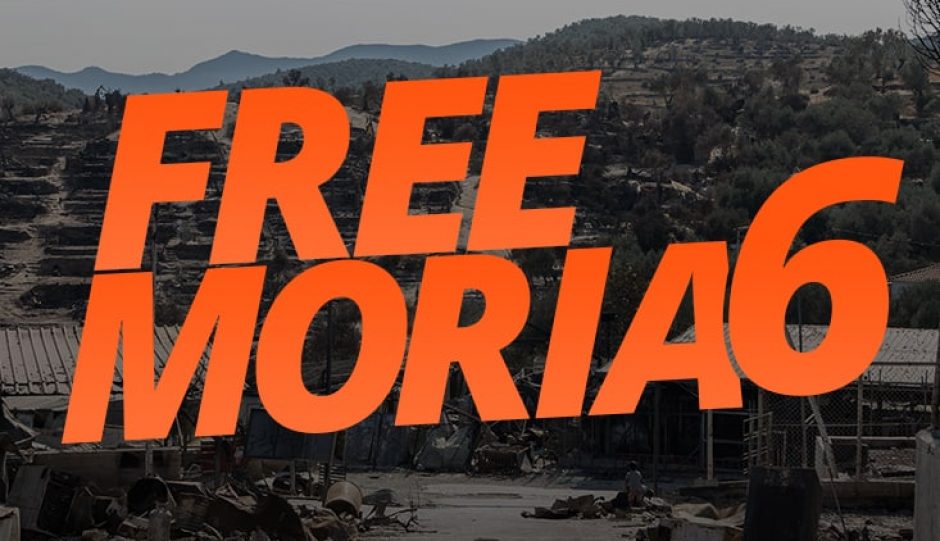Finally, a court has spoken justice: On April 4, 2025, three of the so-called “Moria 6” were acquitted of all charges by the juvenile court in Mytilini! They had been convicted of arson along with three other teenagers. These six young people from Afghanistan were absurdly blamed for the violent fires that destroyed the catastrophic Moria camp on Lesbos on September 8-9, 2020.
The appeal hearing, which took place from March 4 to 8, 2024, was marked by racist comments from the prosecutor and, as in the previous hearings, an unfair trial. However, the appeals court acknowledged that these three teenagers were also minors at the time of their arrest and had therefore been sentenced to 10 years in prison in June 2021 by a court that did not have jurisdiction and referred the case to the juvenile court.
The three defendants were released after almost four years of unjustified detention and awaited their trial before the juvenile court. On April 4, 2025, the court found the three defendants not guilty and ruled that their involvement in the fire in September 2020 had not been proven. Zacharias Kesses, who represented them together with his colleague Evita Papakyriakidou, stated: “A fair trial was finally held through an exemplary judicial process. An unthinkable miscarriage of justice was corrected, and three individuals—unjustly targeted and imprisoned for nearly four years—were unanimously acquitted. Justice prevailed.”
H., one of the acquitted young men, added with relief: “First of all, I would like to thank those who have supported us until today. After this trial, I want to have a very beautiful life and be able to shape my future. And I am so happy to have come out of this darkness into the light. I hope I don’t feel any more pain after all this pain.”
Human rights activist Nasim Lomani, who testified as an expert witness, stated: “The three unaccompanied minors who were accused together with 3 more refugees for the fire destroyed in Moria, proved innocent at the court of Mytilene, after serving 3.5 years in adult prison. The refugee boys get their freedom back, but the injustice and brutality they faced for all those years remains unanswered.”
Absurd charges and defense strategy
The catastrophic Camp Moria, Greece’s largest camp, was completely destroyed by fires in September 2020. Designed to house up to 3,000 people, Moria was dangerously overcrowded at the time, with up to 13,000 people living in and around the camp. Many people lived in self-built huts and tents in nearby olive groves. The Covid pandemic exacerbated the terrible living conditions. After the fire, all media attention focused on the degrading situation of the people seeking protection on the Greek islands at the EU’s external border. In parallel, six young people from Afghanistan were arrested and made scapegoats for failed policies.
The prosecution’s case was based solely on the written statement of one camp resident, which mentioned only first names and lacked any evidence. This “witness” disappeared from the island and never appeared at the trial to testify in person. It is also noteworthy that this “witness” belonged to the Pashtun group and named teenagers belonged to the Hazara group. The defense strategy was to cast doubt on the credibility of this witness’s statement. Two experts testified about the conflicts in Camp Moria between Pashtuns and Hazaras. A comprehensive report by Forensic Architectures (with video material from ReFOCUS media lab) on the course of the fires on September 8/9, 2020, underpinned the doubts about the statement. The defense was supplemented by a description of the positive behavior of the teenagers in prison and since their release.
What about the other three young people?
F. was found guilty again in the appeal court in March 2024. The dubious verdict from the first instance (June 2021) was upheld, only the sentence was reduced from 10 to 8 years due to good behavior in prison. F. was released on parole in July 2024 but must remain in Greece. His lawyer, Zacharias Kesses, has filed an appeal to the Greek Supreme Court against his unjust verdict. We hope that the current verdict will also have a positive effect on him, as his conviction too was also based solely on the accusation in the written statement of the only witness.
The two teenagers of the “Moria 6,” who were recognized as minors at the time of their arrest, were sentenced to five years in prison by the juvenile court in March 2021 in separate proceedings. In the appeal court in June 2022, the sentence was reduced to four years. A. was released on parole in the summer of 2023. M. was not released until March 2024, as he was taken into custody following his prison sentence. In May 2024, the Legal Center Lesvos filed a complaint with the European Court of Justice on behalf of the two teenagers after the Greek Supreme Court rejected their appeal.
What happens now?
The prosecution and conviction of the six young people is yet another shocking example of the criminalization of people on the move. The aim is to cover up the crimes of the EU and Greece, who build inhumane camps such as the one in Moria, carry out illegal pushbacks, and systematically disenfranchise those seeking protection through legal reforms like the “Common European Asylum System” (CEAS).
In this respect, the finally achieved victory of justice is of great significance, not only for the three young men, but also in the fight against the arbitrary criminalization of refugees.
We, the #FreetheMoria6 campaign, have been supporting the six young people since their arrest. Further court proceedings will require some more financial resources.
We still need your support!
Please send donations to
Rote Hilfe e.V./ OG Hannover;
IBAN: DE42 4306 0967 4007 2383 57BIC: GENODEM1GLS, GLS Bank,
Reference: Moria6
